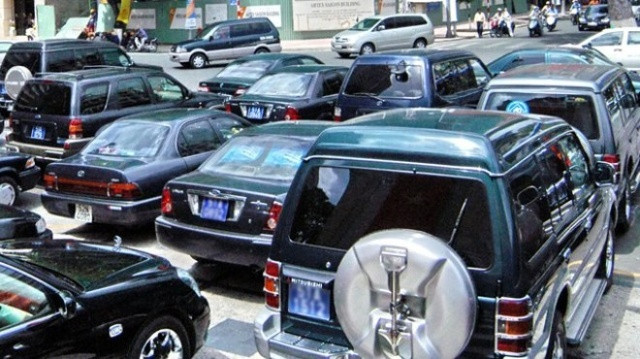Prime Minister requests to limit the purchase of expensive cars and equipment
The Prime Minister has just issued the Government's overall program on practicing thrift and fighting waste in 2017.
Practicing thrift and combating waste is carried out in all fields according to the provisions of the Law on Practicing Thrift and Combating Waste.
The Prime Minister requested that in 2017, we must tighten financial and state budget discipline; ensure that state budget spending is economical, effective, and in accordance with the estimates approved by the National Assembly; and thoroughly save right from the stage of preparing, allocating, and assigning the 2017 budget estimates to ministries, agencies, and units.
Ministries, agencies and units must thoroughly save on regular expenditures (excluding salaries and other salary-related expenses, contributions to employees as prescribed) to create sources for salary reform, limit unnecessary meetings, integrate contents and tasks that need to be handled; reduce the frequency of organizing festivals and holidays using the state budget, especially large-scale festivals; strive to save at least 12% of expenses for conferences, seminars, talks, meetings, receptions, celebrations, organizing festivals and celebrations, using gasoline, electricity, water, stationery, books, newspapers and magazines; limit the allocation of funds for overseas research and surveys; save at least 15% of outgoing and incoming delegations, and do not arrange outgoing delegations in regular expenditures for national target programs.
Ministries, agencies and units cut 100% of the organization of groundbreaking ceremonies, commencement ceremonies and inauguration ceremonies for basic construction works, except for important national works, group A projects, works of important economic, political, cultural and social significance to the locality.
 |
| Illustration photo. |
Limit car purchases
In the management and use of land, offices, public housing, and public assets, the Prime Minister requested to limit the purchase of cars (except specialized cars) and expensive equipment; the purchase of new cars (including cars for official positions, cars for general work, and specialized cars) by agencies, organizations, and units can only be carried out when all conditions are met according to regulations.
Study and amend Decision No. 32/2015/QD-TTg dated August 4, 2015 of the Prime Minister stipulating standards, norms and regimes for management and use of cars in state agencies, public service units, and one-member limited liability companies with 100% state-owned charter capital in the direction of amending the unit price for car use expenses suitable for each group of positions with standards for use and norms for cars for general work; determine the roadmap for implementing the car use expense allowance regime applicable to the positions of deputy ministers and equivalent, cars for general work.
Land, offices, and public housing assigned to agencies, units, and organizations must be managed and used for the right purposes, effectively, and ensure thrift; improve the efficiency of public housing use; reclaim 100% of public housing used for the wrong purposes, for the wrong subjects, or for subjects whose public housing use period has expired according to regulations.
Reduce 1.5 to 2% of staff
In 2017, ministries, agencies and units continue to strictly implement the Government's regulations on streamlining staff, ensuring the target of reducing 1.5 to 2% of the civil servant and public service staff assigned in 2015 is achieved. Ministries, branches and localities that have not yet reduced the public service staff in 2016 compared to the staff assigned in 2015 must reduce at least 3% of the staff assigned in 2015 in 2017.
Restructuring the staff of cadres, civil servants and public employees in conjunction with reforming the state administrative apparatus, innovating the operating mechanism of public service units and reforming salaries.
For public service units with career revenue sources, it is encouraged to promote the conversion of an additional 10% of the number of civil servants to the mechanism of autonomy, self-responsibility and socialization, replacing salary payment from the state budget with salary payment from career revenue sources.
Agencies, organizations and units shall only recruit new cadres, civil servants and public employees not exceeding 50% of the number of cadres, civil servants and public employees who have undergone streamlining and not exceeding 50% of the number of cadres, civil servants and public employees who have had their retirement or termination benefits resolved according to regulations.
Agencies, organizations, and units shall review and simplify administrative procedures related to recruitment procedures for civil servants and public employees, procedures for civil servant promotion exams, and professional title promotion exams for public employees according to the Government's annual administrative procedure simplification plan and instructions and regulations of ministries and branches.
Agencies, organizations and units continue to review, revise and supplement solutions to create clear changes in improving the investment and business environment, simplifying administrative procedures, especially in the tax, customs and state treasury systems; creating maximum convenience and reducing time and costs for administrative transactions of people and businesses.
Agencies, organizations and units strive to achieve at least the average of ASEAN 4 countries on business environment indicators, aiming to reduce tax and social insurance payment time to no more than 168 hours/year (of which tax is 119 hours and insurance is 49 hours); construction licensing and related procedures to no more than 120 days, of which the time for basic design appraisal, technical design appraisal, and construction licensing is reduced to 63 days...
According to Vietnamnet.vn
